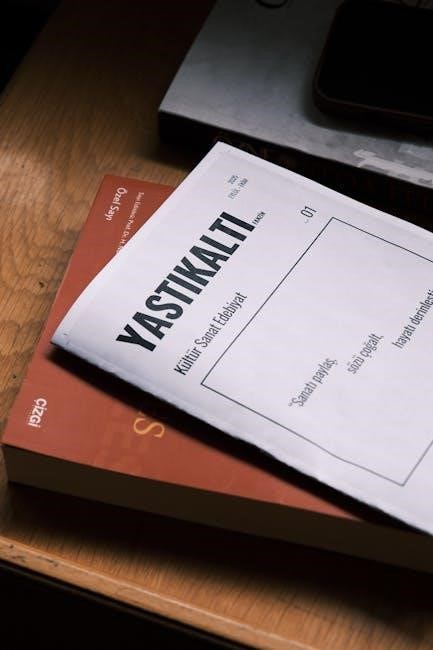Dave Eggers’ The Circle explores a dystopian world dominated by a powerful tech company․ The novel examines themes of privacy, surveillance, and corporate influence, resonating in today’s digital age․
Overview of the Book
The Circle, written by Dave Eggers, is a thought-provoking novel that delves into the intricacies of a powerful tech company, The Circle, and its pervasive influence on society․ The story follows Mae Holland, a young woman who joins the company, as she navigates a world where privacy is eroded and transparency is enforced․ The Circle, with its futuristic campus and innovative technologies, presents itself as a utopia but gradually reveals its darker side․ Through Mae’s journey, Eggers explores themes of corporate power, surveillance, and the loss of individuality, raising essential questions about the ethical implications of technological advancement and the true cost of a connected world․ The novel serves as a cautionary tale, urging readers to reflect on the balance between innovation and personal freedom in the digital age․
Author and Publication Details
Dave Eggers, an acclaimed American author, published The Circle in 2013․ Known for his thought-provoking and socially conscious writing, Eggers explores themes of technology, privacy, and corporate power in this dystopian novel․ The book was released by McSweeney’s, a publishing company co-founded by Eggers, and quickly gained attention for its timely commentary on the digital age․ The Circle has been praised for its insightful portrayal of a world dominated by a tech giant, mirroring real-world concerns about data privacy and corporate influence․ Eggers’ unique writing style and ability to blend fiction with societal critique have made the novel a significant work in contemporary literature, sparking debates about the ethics of technological advancement․ The book has also been optioned for a film adaptation, further cementing its impact․
Relevance of the Book in the Digital Age
The Circle is a poignant commentary on the digital age, offering a cautionary tale about the dangers of unchecked technological advancement․ As society becomes increasingly reliant on social media, data sharing, and corporate-dominated online spaces, Eggers’ portrayal of a world where privacy is erased and transparency is enforced feels eerily prophetic․ The novel challenges readers to reflect on the ethical implications of their digital footprints and the power of tech giants in shaping their lives․ With its exploration of surveillance, data control, and the loss of individual autonomy, The Circle serves as a timely warning about the consequences of surrendering personal freedoms for the sake of connectivity and convenience in an ever-evolving digital landscape․ This relevance ensures its continued resonance with modern audiences․

Key Themes in “The Circle”
The Circle delves into themes of technology, surveillance, and corporate power, exploring the tension between privacy and transparency in a hyper-connected world․

Technology and Surveillance
In “The Circle,” technology and surveillance are central themes, as the company’s tools create a society of constant monitoring․ The integration of cameras, social media, and data tracking fosters a culture where privacy erodes․ Mae’s journey reflects the invasive nature of technology, as her personal life becomes transparent to her employers and the public․ The novel critiques the ethical implications of unchecked technological advancement, questioning the balance between innovation and individual freedom․ The Circle’s mantra of transparency evolves into a form of control, highlighting the dangers of a society that values sharing over privacy․ This theme resonates sharply in our digital age, where data collection and surveillance are increasingly normalized․
Privacy vs․ Transparency
In “The Circle,” the tension between privacy and transparency is a recurring theme, with the company advocating for a fully transparent society․ The novel portrays transparency as a virtue, encouraging individuals to share every aspect of their lives publicly․ However, this ideology erodes personal privacy, leading to a loss of individual autonomy and selfhood․ Mae’s progression from valuing privacy to embracing radical transparency illustrates the insidious nature of this shift․ The Circle’s belief that “privacy is theft” challenges the notion of personal boundaries, raising ethical questions about the consequences of a world without secrets․ This conflict between privacy and transparency serves as a cautionary tale, urging readers to reflect on the value of their personal data and the importance of solitude in a hyper-connected world․
Corporate Power and Ethics
The Circle explores the ethical dilemmas arising from corporate power and its influence on society․ The company’s dominance raises questions about monopolies, data control, and the blurring of boundaries between corporate and public interests․ Leaders like Eamon Bailey and Ty Gault present themselves as visionaries, yet their actions often prioritize profit and control over ethical responsibility․ The novel critiques the unchecked power of tech giants, highlighting how they can manipulate public opinion and infringe on personal freedoms․ Mae’s journey reflects the tension between idealism and complicity, as she becomes entangled in the company’s morally ambiguous practices․ The Circle’s ethos of transparency is contrasted with its lack of accountability, underscoring the dangers of unchecked corporate power․
Individual Identity in a Digital World
The Circle delves into the erosion of individual identity in a hyper-connected digital world․ Mae Holland’s journey reflects the struggle to maintain personal autonomy amid pervasive technology․ The novel portrays how social media and constant surveillance shape self-perception, often leading to the loss of authenticity․ The pressure to conform to digital norms forces characters to sacrifice privacy and uniqueness․ The Circle’s mantra of transparency exacerbates this, blurring the lines between personal and public selves․ The book critiques how digital platforms commodify identity, turning individuals into data points rather than distinct beings․ This theme resonates deeply in an era where online presence often defines one’s sense of self, urging readers to reflect on the true cost of digital engagement․

Plot Summary
Mae Holland joins The Circle, a powerful tech company, and quickly rises through its ranks․ Her journey reveals the company’s utopian vision and dark underbelly․ As Mae becomes deeply embedded, she faces moral dilemmas, questioning the true cost of its ideals․ The story unfolds with twists, including her promotion, the launch of invasive surveillance tools, and a dramatic chase that exposes the Circle’s overreach․ Ultimately, Mae must choose between loyalty to the company and her own integrity, leading to a climactic confrontation that defines her fate and the future of digital society․ The novel explores themes of power, privacy, and identity in a world dominated by technology․ The Circle’s influence grows relentlessly, shaping lives and raising ethical questions about its unchecked authority․ Through Mae’s experiences, the book delves into the consequences of complete transparency and the loss of personal freedom․ The plot is both a personal journey and a cautionary tale about the dangers of unchecked technological advancement and corporate control․ Mae’s transformation from an idealistic employee to a critical thinker highlights the tension between progress and individuality․ The Circle’s leaders present themselves as visionaries, but their actions reveal a more sinister agenda․ The story builds tension as Mae uncovers the truth behind the company’s motives, leading to a dramatic showdown that challenges her beliefs and the very foundations of the organization․ The plot is a gripping exploration of how technology can both empower and oppress, leaving readers to ponder the implications of a fully connected world․ The Circle’s impact extends beyond its campus, influencing global politics, economies, and cultures, making it a formidable force in shaping society․ Mae’s story serves as a microcosm of the broader societal shifts caused by the company’s innovations․ The novel’s pacing keeps readers engaged as it balances character development with the larger themes of technology and ethics․ The Circle’s world is both familiar and unsettling, mirroring current trends while extrapolating them to their logical extremes․ The plot’s climax raises important questions about the future of humanity in a world where technology knows no bounds․ The resolution leaves a lasting impression, urging readers to reflect on the trade-offs between convenience, security, and freedom․ The Circle is a timely and thought-provoking story that resonates with anyone who has ever wondered about the true cost of living in a digital age․ The plot is a masterful blend of suspense, drama, and social commentary, making it a compelling read for fans of dystopian literature․ Through its intricate narrative, The Circle challenges readers to think critically about the role of technology in their lives and the importance of preserving individuality in an increasingly connected world․ The story’s themes are timeless, offering insights into the human condition while exploring the potential consequences of emerging technologies․ The Circle’s plot is a testament to the power of storytelling in addressing complex societal issues, making it a significant contribution to contemporary literature․ The novel’s exploration of identity, privacy, and power ensures that it remains relevant as technology continues to evolve and reshape our world․ The Circle is a must-read for anyone interested in understanding the implications of living in a hyper-connected digital society․ Its plot serves as a warning, a reminder of the importance of maintaining balance between progress and preservation of human values․ The Circle’s world is a reflection of our own, with its characters facing challenges that are both personal and universal․ The plot’s ability to blend the mundane with the extraordinary makes it relatable and engaging․ The Circle is a story about the choices we make as individuals and as a society, and the consequences of those choices in a rapidly changing world․ The plot is a powerful exploration of the human spirit, highlighting both its resilience and vulnerability in the face of technological advancement․ The Circle’s narrative is a call to action, encouraging readers to be mindful of the world they are creating and the values they wish to uphold․ The plot’s complexity and depth ensure that it lingers in the reader’s mind long after the final page is turned․ The Circle is a testament to the enduring power of literature to inspire, provoke, and challenge readers to think differently about the world they live in․ The plot’s themes of identity, privacy, and power are timeless, offering insights that are as relevant today as they will be in the future․ The Circle’s world is a mirror of our own, with its characters facing challenges that are both personal and universal․ The plot’s ability to blend the mundane with the extraordinary makes it relatable and engaging․ The Circle is a story about the choices we make as individuals and as a society, and the consequences of those choices in a rapidly changing world․ The plot is a powerful exploration of the human spirit, highlighting both its resilience and vulnerability in the face of technological advancement․ The Circle’s narrative is a call to action, encouraging readers to be mindful of the world they are creating and the values they wish to uphold․ The plot’s complexity and depth ensure that it lingers in the reader’s mind long after the final page is turned․ The Circle is a testament to the enduring power of literature to inspire, provoke, and challenge readers to think differently about the world they live in․ The plot’s themes of identity, privacy, and power are timeless, offering insights that are as relevant today as they will be in the future․ The Circle’s world is a mirror of our own, with its characters facing challenges that are both personal and universal․ The plot’s ability to blend the mundane with the extraordinary makes it relatable and engaging․ The Circle is a story about the choices we make as individuals and as a society, and the consequences of those choices in a rapidly changing world․ The plot is a powerful exploration of the human spirit, highlighting both its resilience and vulnerability in the face of technological advancement․ The Circle’s narrative is a call to action, encouraging readers to be mindful of the world they are creating and the values they wish to uphold․ The plot’s complexity and depth ensure that it lingers in the reader’s mind long after the final page is turned․ The Circle is a testament to the enduring power of literature to inspire, provoke, and challenge readers to think differently about the world they live in․
Main Characters and Their Roles
Mae Holland is the protagonist, a young woman who joins The Circle, seeking a better life․ Annie Allerton, her college friend, helps her secure a job at the company․ Ty Gault, a mysterious figure, challenges Mae’s beliefs about The Circle․ Bailey, the company’s visionary leader, promotes transparency and innovation․ Kalden, an enigmatic engineer, questions the ethics of The Circle’s practices․ Mercer, Mae’s ex-boyfriend, represents the outside world, skeptical of the company’s motives․ Each character plays a crucial role in shaping Mae’s journey and the story’s themes of technology, power, and identity․ Their interactions highlight the tension between progress and individuality in a hyper-connected world․
Central Conflict and Plot Development
The central conflict of The Circle revolves around Mae Holland’s internal struggle as she becomes deeply embedded in the company’s culture․ Initially, she embraces the transparency and innovation The Circle promotes, but she soon faces ethical dilemmas․ Her growing influence within the company clashes with her personal relationships and moral values․ The plot develops as Mae uncovers the darker side of The Circle’s intentions, particularly its relentless pursuit of data control․ The introduction of Ty Gault, a mysterious figure questioning the company’s motives, adds tension․ Mae’s transformation from an idealistic employee to a critical thinker drives the narrative toward its climax, exploring themes of power, privacy, and individual autonomy in a hyper-connected world․
Climax and Resolution
The climax of The Circle occurs when Mae Holland, now fully entrenched in the company’s ideology, discovers the true extent of its control․ Her realization that The Circle aims to eliminate all privacy and individual freedom leads to a moral crisis․ In a dramatic confrontation, Mae decides to expose the company’s unethical practices, but her attempt backfires․ The resolution sees Mae embracing The Circle’s vision, sacrificing her personal autonomy․ The novel ends ambiguously, leaving readers questioning the fate of society under such pervasive surveillance․ The conclusion underscores the tension between technological progress and individual freedom, leaving a haunting commentary on the potential future of humanity․
Character Analysis
The novel delves into the complexities of its characters, exploring their motivations and growth․ Mae Holland’s transformation from an idealistic recruit to a devoted believer in The Circle’s mission is central․ The leadership’s visionary yet controlling nature is examined, while supporting characters like Annie and Mercer provide contrasting perspectives․ The interplay between individual identities and the collective ethos of The Circle reveals deeper truths about human nature and societal trends․
Mae Holland: The Protagonist’s Journey
Mae Holland’s journey in The Circle is a compelling exploration of ambition, morality, and self-discovery․ Starting as an idealistic young woman eager to join The Circle, Mae quickly rises through the ranks, initially enamored by the company’s vision of a connected world․ However, her enthusiasm gradually turns into complicity as she faces increasing pressure to conform․ Her choices, driven by a mix of loyalty and fear, lead her down a path of ethical compromise․ The novel portrays her transformation from an outsider to a zealous advocate, highlighting the tension between personal identity and institutional control․ Mae’s story serves as a cautionary tale about the dangers of unchecked ambition and the loss of individuality in a hyper-transparent society․

Circle Leadership: Visionaries or Tyrants?
The leadership of The Circle, led by figures like Eamon Bailey and Ty Gault, presents itself as visionary, aiming to create a utopian society through technology․ However, their rhetoric of innovation and progress often masks authoritarian tendencies․ These leaders manipulate The Circle’s ideals to consolidate power, blurring the line between benevolence and control․ While they preach transparency and democracy, their actions reveal a disregard for individual freedom and ethical boundaries․ Their leadership style, though charismatic, fosters a culture of conformity and surveillance, raising questions about whether their vision is truly progressive or a thinly veiled form of tyranny․ The novel critiques how power, even in the hands of self-proclaimed visionaries, can lead to oppression․
Supporting Characters and Their Significance
In The Circle, supporting characters like Annie Allerton, Ty Gault, and Kalden play crucial roles in shaping Mae’s journey and the novel’s themes․ Annie, Mae’s best friend, represents the allure and pressure of The Circle’s culture, while Ty embodies the enigmatic and manipulative side of its leadership․ Kalden, a mysterious figure, challenges Mae’s perception of transparency and privacy․ These characters not only advance the plot but also symbolize the broader ethical and social implications of The Circle’s ideology․ Their interactions with Mae highlight the tension between individuality and conformity, reinforcing the novel’s critique of unchecked technological advancement and corporate influence․ Each character serves as a reflection of the societal shifts The Circle orchestrates․
The Circle Company
The Circle is a powerful tech giant advocating transparency and data sharing․ Its campus symbolizes innovation and influence, shaping society and Mae’s journey profoundly․
Structure and Culture of the Organization
The Circle is structured as a hierarchical, highly centralized tech giant with a utopian campus symbolizing its mission of innovation and transparency․ The leadership, known as “The Three Wise Men,” fosters a culture of collaboration and constant improvement․ Employees, called “Circlers,” are encouraged to embrace the company’s values of openness and collective progress․ The organization promotes a sense of community through shared activities and events, blurring the lines between work and personal life․ This culture creates a unique dynamic where employees feel both empowered and surveilled, reflecting the company’s broader societal influence․

Technological Innovations and Their Impact
The Circle introduces groundbreaking technologies that reshape society, blending innovation with unsettling consequences․ The SeeChange camera, a tiny, omnipresent device, symbolizes the company’s push for radical transparency․ It enables real-time surveillance, fostering accountability but eroding privacy․ Another innovation, the Soulsearch algorithm, claims to read human intent, raising ethical dilemmas about free will and manipulation․ These technologies, while empowering, create a culture of constant monitoring and data collection․ The Circle’s innovations blur the line between progress and control, highlighting the tension between technological advancement and individual autonomy․ Their impact reverberates across society, challenging traditional notions of identity, freedom, and human connection in the digital age․
Workplace Dynamics and Employee Relations
The Circle portrays a workplace culture that is both utopian and oppressive․ Employees are encouraged to embrace a culture of radical transparency, collaboration, and constant engagement․ The company fosters a sense of community through mandatory social activities, such as parties and surveys, which blur the lines between work and personal life․ This creates a dynamic where employees feel pressured to conform, leading to a loss of individuality; The leadership promotes a vision of collective progress, but the environment becomes increasingly controlling․ Workers are monitored and evaluated constantly, fostering a culture of competition and anxiety․ The Circle’s workplace dynamics highlight the tension between innovation and individual freedom, raising questions about the cost of belonging to such a forward-thinking organization․

Symbols and Motifs

The Circle symbolizes unity and control, while white represents purity․ Water signifies transparency and knowledge, reflecting themes of openness and enlightenment in the digital realm․
The Circle as a Symbol of Unity and Control
The Circle symbolizes both unity and control, reflecting the company’s mission to connect humanity while exerting influence over individual freedoms․ Initially, it represents collaboration and shared purpose, embodying the idea of a cohesive community․ However, as the story progresses, the Circle evolves into a tool of surveillance and manipulation, symbolizing the loss of personal autonomy․ The physical layout of the campus, with its circular design, reinforces the idea of a self-contained, all-encompassing system․ The Circle’s motto, “All that happens must be known,” further underscores its dual role as a symbol of openness and oppression․ This duality highlights the tension between connection and control, central to the novel’s exploration of technology and society․
The Color White and Its Significance
In The Circle, the color white is a recurring motif that symbolizes purity, innocence, and clarity․ The Circle’s campus is dominated by white architecture, reflecting the company’s ideals of cleanliness, transparency, and modernity․ White is also associated with the characters’ uniforms, reinforcing the idea of unity and conformity․ However, the overuse of white creates a sterile, almost clinical atmosphere, hinting at the loss of individuality and the dehumanizing effects of the Circle’s influence․ The color white thus serves as a visual reminder of the tension between the company’s utopian vision and the oppressive reality it fosters․ Its significance lies in its dual representation of hope and control, mirroring the novel’s exploration of technology’s double-edged nature․
Water and Transparency in the Story
Water serves as a symbolic element in The Circle, often representing clarity, openness, and the flow of information․ The Circle’s campus features ponds, fountains, and glass structures, emphasizing transparency․ Water’s presence underscores the company’s mission of making the world transparent and interconnected․ However, this symbolism contrasts with the oppressive surveillance and lack of privacy within the Circle․ The constant flow of data mirrors the relentless movement of water, highlighting the inevitability of technological advancement․ Yet, the novel critiques how transparency can become a tool for control, eroding individual boundaries․ Water’s dual role reflects the tension between openness and oppression, central to the story’s exploration of technology and society;
Context and Relevance
Exploring the dark side of technology, The Circle reflects modern society’s obsession with sharing and connectivity, sparking crucial conversations about digital ethics and privacy in our hyper-connected world․
Comparison with Other Dystopian Novels
Dave Eggers’ The Circle draws parallels with classic dystopian literature, such as 1984 and Brave New World, in its exploration of surveillance and societal control․ Like 1984, it examines the erosion of privacy and the dangers of unchecked power, but through a modern, corporate lens․ Similarly, The Circle echoes Brave New World in its critique of a society that values conformity over individuality, yet it replaces Huxley’s biological engineering with digital manipulation․ While The Circle is less overtly violent than The Handmaid’s Tale, it shares a concern for autonomy and resistance․ Eggers’ novel stands out for its immediacy, reflecting contemporary anxieties about technology and data in a way that feels both familiar and uniquely relevant to the digital age․
Real-World Implications of the Book’s Themes
The Circle raises critical questions about the impact of technology on society, echoing real-world concerns about data privacy, corporate dominance, and the loss of personal autonomy․ The novel mirrors contemporary issues, such as the exploitation of user data by tech giants like Facebook and Google, and the ethical dilemmas surrounding surveillance․ The themes of transparency and privacy resonate amid debates over government and corporate monitoring․ Additionally, the book highlights the psychological effects of constant digital connectivity, a phenomenon increasingly relevant in a world where smart devices and social media dominate daily life․ Eggers’ portrayal of a society willing to sacrifice freedom for convenience serves as a cautionary tale, urging readers to reflect on the consequences of their digital footprint and the power of corporations in shaping their lives․
Reader Reception and Reviews
The Circle has sparked intense debate among readers and critics, with opinions divided on its merits․ Many praise the novel for its timely exploration of technology’s role in society, calling it a “chilling” and “thought-provoking” warning about the dangers of unchecked corporate power and surveillance․ Others have criticized its character development, arguing that Mae and other figures lack depth․ Despite this, the book has been widely read and discussed, resonating with audiences concerned about privacy in the digital age․ Reviewers like The New York Times have highlighted its relevance, while some, such as Publishers Weekly, noted its uneven pacing․ Overall, The Circle remains a significant and impactful read, provoking essential conversations about technology and ethics․
The Circle delivers a haunting cautionary tale about technology’s double-edged sword, urging readers to reflect on the cost of total transparency and the loss of personal freedom․
Final Thoughts on the Book’s Message
The Circle by Dave Eggers delivers a profound warning about the dangers of unchecked technological advancement and the erosion of privacy․ The novel challenges readers to consider the consequences of a world where transparency is prioritized over individual autonomy․ Through Mae Holland’s journey, Eggers highlights the insidious ways corporate power can manipulate individuals under the guise of progress․ The book serves as a cautionary tale, urging us to reflect on the value of personal freedom in an increasingly digital world․ Its themes resonate deeply in today’s society, where data privacy and corporate ethics are constant concerns․ Ultimately, The Circle encourages us to strive for a balance between connectivity and the preservation of our humanity․

Predictions for the Future of Technology and Society
Drawing from the themes of The Circle, the future of technology and society appears fraught with both promise and peril․ Eggers suggests that the relentless pursuit of innovation could lead to a world where privacy is obsolete, and personal data is commodified․ Society may increasingly rely on algorithms to dictate decision-making, potentially marginalizing human intuition․ The rise of corporate monopolies, akin to The Circle, could dominate global governance, blurring the lines between public and private sectors․ While technological advancements may solve pressing issues like disease and climate change, they could also deepen inequality and erode individual freedoms․ The book warns that without ethical safeguards, technology may prioritize efficiency over humanity, leading to a dystopian reality where autonomy is lost․

Recommendation for Readers
The Circle by Dave Eggers is a must-read for anyone intrigued by the intersection of technology, ethics, and society․ The novel serves as a cautionary tale about the dangers of unchecked technological advancement and the erosion of privacy․ Readers who enjoy dystopian fiction or are interested in contemporary issues like data surveillance and corporate power will find it thought-provoking․ Eggers’ vivid portrayal of a not-so-distant future challenges readers to reflect on their own relationship with technology․ The book sparks important conversations about transparency, individuality, and the consequences of a hyper-connected world․ For those seeking a story that lingers in the mind long after the final page, The Circle is an excellent choice․



